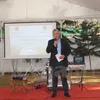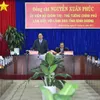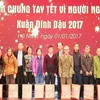ASEAN Secretary General highlights bloc’s one-year achievements
During the first year of its formation, the ASEAN Community adopted a series of measures to strengthen the community across all the three pillars, he said.
The Political-Security Community has implemented 165 out of 290 action lines while the Economic Community has built and adopted specific action plans for most sectors, including trade promotion, food security, business start-ups, development of small and medium-sized enterprises, cooperation among special economic zones, transparency in tariff lines, and the settlement of complaints regarding trans-border issues in the implementation of ASEAN economic deals.
The Socio-Cultural Community has adopted detailed working plans across the fields and recorded specific outcomes serving integration and cooperation as well as priority fields of disaster management, humanitarian aid, climate change, environmental protection, cultural exchange, education and labour.
Last year, the ASEAN passed two important documents, which were the ASEAN Declaration on Coping with Disasters as a Single Entity in and outside the region, and the ASEAN Declaration on Climate Change, which will regulate ASEAN’s activities at international forums on climate change.
The bloc also adopted a master plan on ASEAN connectivity until 2025 and action plans for the third phase of the ASEAN Integration Initiative.
In external relations, ASEAN has reached agreement with Russia and the US to upgrade bilateral ties to the strategic partnership level. The bloc has also concurred with the Eurasian Economic Union and Canada on the possibility to formulate free trade agreements.
The Secretary General stressed that amid complicated developments in the region and the world, ASEAN was able to maintain its central role in regional mechanisms and in regulating external ties with partners.
According to Minh, one of the greatest challenges to the region and the ASEAN Community is the complicated developments in the East Sea. Such actions as the construction of artificial islands, extension of disputed islands illegally occupied by China, and militarisation in the East Sea have eroded trust between ASEAN and one of its most important partners which is also a comprehensive cooperative strategic partner.
He noted that in 2016 ASEAN and China were able to reach agreement on accelerating the consultation and negotiations towards an early completion of a Code of Conduct in the East Sea (COC).
In 2017, ASEAN stands ready to speed up the consultation and negotiations for not only the framework but also the content of the COC, Minh said, adding that the COC should be made legally binding and ensure the full and serious implementation of the Declaration on the Conduct of Parties in the East Sea (DOC).
The second major threat to the region and the ASEAN Community is rising terrorism and extremism in the region and the world. Several ASEAN member states were the sources of recruitment for the self-claimed Islamic State (IS), and in the context of the IS being almost annihilated in the Middle East, it is possible that IS recruitment would increase in the region or IS armed men would flee to ASEAN countries, Minh said, stressing that ASEAN should get prepared to cope with this threat.
The third challenge is that while ASEAN moves to expand external relations to play a greater role at regional forums according to its vision through 2015, a number of the bloc’s key partners are witnessing a return to or flare-up of extreme nationalism as well as populism. According to the Secretary General, the situation requires ASEAN to exert efforts to diversify external relations, particularly economic ones, such as working for the early completion of negotiations on the Regional Comprehensive Economic Partnership (RCEP) and the free trade area agreement with potential partners, including China’s Hong Kong, resuming negotiations with the EU, and considering a possible agreement on free trade area with new partners like the Eurasian Economic Union or Canada.
Regarding plans for 2017 – the year SEAN will mark its 50th founding anniversary, Minh said the celebration will be a good occasion for the association to evaluate its success and put forth orientations for the ASEAN Community and promoting integration, particularly realising the ASEAN Vision 2025.
He highlighted the ASEAN 2017 theme, which focuses on cooperating for change and proactively engaging the world. The Chair of ASEAN in 2017, the Philippines, has set forth six priorities for this year’s activities, namely, continuously building a people-centered community; strengthening regional security and stability; enhancing security and cooperation at sea; increasing ASEAN self-reliance capacity; building ASEAN into a typical model on regional cooperation; and proactively integrating into the world.
Such priorities truly reflect the “looking forward” spirit of the ASEAN Vision 2025, Minh said, adding that the bloc will continue reinforcing the community as a dynamic, highly competitive and globally interactive one with stronger political and economic cohesion and social responsibilities.
Mentioning the comments of some ASEAN member states that the bloc should change the articles on consensus in its Charter to suit the new situation, Minh said ASEAN will review and update the Charter.
He stressed that this is the matter of updating, not revising the Charter, which means fundamental principles and terms on consensus will not be changed. The update of the Charter is aimed at making the application of the stipulations more flexible and ensure the bloc’s more efficient operation.





